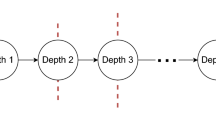Abstract
A generalization of the standard n-person game is presented, with flexible information requirements suitable for players constrained by certain types of bounded rationality. Strategies (complete contingency plans) are replaced by “policies”, i.e., endmean pairs of goals and controls (partial contingency plans), which results in naturally disconnected player choice sets. Well-known existence theorems for pure strategy Nash equilibrium and bargaining solutions are generalized to policy games by modifying connectedness (convexity) requirements.
Similar content being viewed by others
References
Aumann, R. J. and Dreze, J. H.: 1974, ‘Cooperative Games with Coalition Structures’, International Journal of Game Theory 3, 217–237.
Berge, C.: 1963, Topological Spaces, The Macmillan Company, N.Y.
Bilkey, W. J.: 1973, ‘Empirical Evidence Regarding Business Goals’, in Multiple Criteria Decision Making by J. L. Cochrane and M. Zeleny (eds.), University of South Carolina Press, Columbia, South Carolina, pp. 614–634.
Brown, R. G.: 1970, The Lefschetz Fixed Point Theorem, Scott, Foresman and Company, Glenview, Illinois.
Cyert, R. M. and March, J. G.: 1963, A Behavioral Theory of the Firm, Prentice-Hall, Inc., New Jersey.
Debreu, G.: 1952, ‘A Social Equilibrium Existence Theorem’, Proceedings of the National Academy of Sciences 38, 886–893.
Dreze, J. H.: 1974, ‘Axiomatic Theories of Choice, Cardinal Utility, and Subjective Probability: a Review’, in Allocation Under Uncertainty: Equilibrium and Optimality, John Wiley & Sons, New York, pp. 3–23.
Luce, R. D. and Raiffa, H.: 1957, Games and Decisions, John Wiley & Sons, Inc., N.Y.
Nash, J.: 1950, ‘The Bargaining Problem’, Econometrica 18, 155–162.
Nash, J.: 1953, ‘Two-person Cooperative Games’, Econometrica 21, 128–140.
Nikaido, H.: 1963; Convex Structures and Economic Theory, Academic Press, N.Y.
Rapoport, A.: 1966, Two-Person Game Theory, The University of Michigan Press, Ann Arbor.
Simon, H.: 1972. ‘Theories of Bounded Rationality’, in Decision and Origanization, by C. B. McGuire and D. Radner (eds.), North-Holland, Amsterdam, pp. 161–176.
Tesfatsion, L.: 1980. ‘A Conditional Expected Utility Model for Myopic Decision Makers’, Theory and Decision 12, 185–206.
Tesfatsion, L.: 1978, ‘A New Approach to Filtering and Adaptive Control’, Journal of Optimization Theory and Applications 25, 247–261.
Tesfatsion, L.: 1979, ‘Direct Updating of Intertemporal Criterion Functions for a Class of Adaptive Control Problems’, IEEE Transactions on Systems, Man, and Cybernetics SMC-9, 143–151.
Tesfatsion, L.: 1982, ‘A Dual Approach to Bayesian Inference and Adaptive Control’, Theory and Decision 14, 177–194.
Tesfatsion, L.: 1983, ‘Pure Strategy Nash Equilibrium Points and the Lefschetz, Fixed Point Theorem’, International Journal of Game Theory 12, 181–191.
Author information
Authors and Affiliations
Rights and permissions
About this article
Cite this article
Tesfatsion, L. Games, goals, and bounded rationality. Theor Decis 17, 149–175 (1984). https://doi.org/10.1007/BF00160981
Issue Date:
DOI: https://doi.org/10.1007/BF00160981



